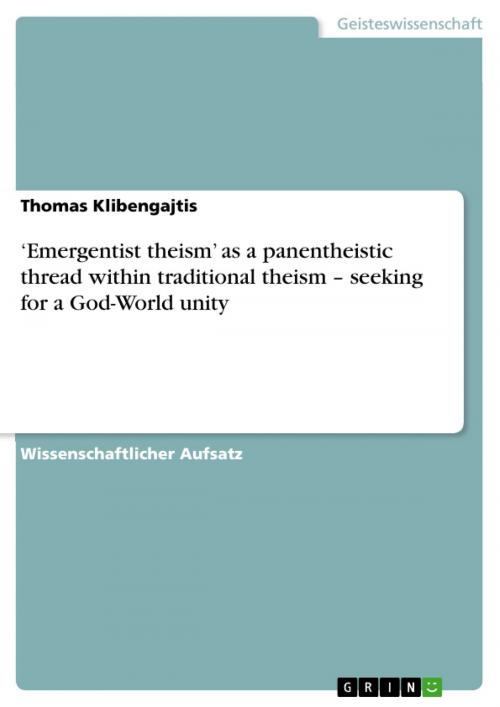'Emergentist theism' as a panentheistic thread within traditional theism - seeking for a God-World unity
Nonfiction, Religion & Spirituality, Theology| Author: | Thomas Klibengajtis | ISBN: | 9783656163251 |
| Publisher: | GRIN Verlag | Publication: | April 2, 2012 |
| Imprint: | GRIN Verlag | Language: | German |
| Author: | Thomas Klibengajtis |
| ISBN: | 9783656163251 |
| Publisher: | GRIN Verlag |
| Publication: | April 2, 2012 |
| Imprint: | GRIN Verlag |
| Language: | German |
Wissenschaftlicher Aufsatz aus dem Jahr 2012 im Fachbereich Theologie - Systematische Theologie, , Sprache: Deutsch, Abstract: Transdisciplinarity is possible only by developing a common meta-level for all disciplines involved. A meta-level containing 'the knowledge of things divine and human' has been known for centuries as wisdom. Wisdom, however, in the latter meaning assumes a higher dimension in which our human world only participates. The aim of this paper is to depict a panentheistic conception of God and world which I would like to name 'the emergentist theism'. The second part of the paper gives reasons for the emphasis of God's transcendence within the Western theism, such as: (1) the transcendent view of God/gods present within the Old Testament and the Greek religious tradition; (2) the philosophical context of Platonism of the rising Jewish and Christian theism. The third part shows how Aristotle's physics, especially his conception of the First Unmoved Mover, exerted influence on the theological conception of God's transcendence being present both in Protestant and Catholic Tradition. Because of the Thomistic influence exerted first on the theology of the Counter Reformation, than on Modern Scholastic and finally on Neo-Scholasticism, this Aristotelian view remained, predominant within the Catholic Tradition up to the Second Vatican Council. The fourths part of the paper depicts how the rise of modern panentheism was influenced by Neo-Scholasticism, Darwinism and German idealism and why, therefore, some panentheists identified the traditional theism with the Neo-Scholastic, i.e. 'the Aristotelian' conception of God. The fifths part gives an introduction into the philosophical and theological monism. By the first I mean the conception of deriving of the many from one principle, by the letter the view of the emergence of creatures from God through Logos. In this conception, which I call 'the emergentist theism', God is not 'outside' but within the creation which expresses and reveals Himself even to Himself. The sixth and last part of the paper shows, in a very short sketch, that some traces of this conception of God's immanence can be found in the writings of: Justin the Martyr, Clemens Alexandrinus, Origen, Gregory of Nyssa, Gregory of Nazianz, Basil of Cesarea, Pseudo-Denys, Maximus Confessor and Gregory Palamas.
Wissenschaftlicher Aufsatz aus dem Jahr 2012 im Fachbereich Theologie - Systematische Theologie, , Sprache: Deutsch, Abstract: Transdisciplinarity is possible only by developing a common meta-level for all disciplines involved. A meta-level containing 'the knowledge of things divine and human' has been known for centuries as wisdom. Wisdom, however, in the latter meaning assumes a higher dimension in which our human world only participates. The aim of this paper is to depict a panentheistic conception of God and world which I would like to name 'the emergentist theism'. The second part of the paper gives reasons for the emphasis of God's transcendence within the Western theism, such as: (1) the transcendent view of God/gods present within the Old Testament and the Greek religious tradition; (2) the philosophical context of Platonism of the rising Jewish and Christian theism. The third part shows how Aristotle's physics, especially his conception of the First Unmoved Mover, exerted influence on the theological conception of God's transcendence being present both in Protestant and Catholic Tradition. Because of the Thomistic influence exerted first on the theology of the Counter Reformation, than on Modern Scholastic and finally on Neo-Scholasticism, this Aristotelian view remained, predominant within the Catholic Tradition up to the Second Vatican Council. The fourths part of the paper depicts how the rise of modern panentheism was influenced by Neo-Scholasticism, Darwinism and German idealism and why, therefore, some panentheists identified the traditional theism with the Neo-Scholastic, i.e. 'the Aristotelian' conception of God. The fifths part gives an introduction into the philosophical and theological monism. By the first I mean the conception of deriving of the many from one principle, by the letter the view of the emergence of creatures from God through Logos. In this conception, which I call 'the emergentist theism', God is not 'outside' but within the creation which expresses and reveals Himself even to Himself. The sixth and last part of the paper shows, in a very short sketch, that some traces of this conception of God's immanence can be found in the writings of: Justin the Martyr, Clemens Alexandrinus, Origen, Gregory of Nyssa, Gregory of Nazianz, Basil of Cesarea, Pseudo-Denys, Maximus Confessor and Gregory Palamas.















